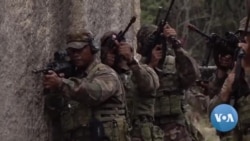Why 10 percent of a Pacific Island nation’s military is taking part in U.S.-led training.
Welcome to VOA Asia Weekly. I'm Chris Casquejo in Washington. That story is coming up, but first, making headlines…
Sri Lankan lawmakers chose six-time Prime Minister Ranil Wickremesinghe as President to succeed ousted leader Gotabaya Rajapaksa, who fled the bankrupt country engulfed in civil turmoil.
A news report that U.S. House Speaker Nancy Pelosi plans a trip to Taiwan drew a warning from China. A Foreign Ministry spokesman said the visit would "be a severe shock to the political foundation of China-US relations.”
Several large Chinese cities, including commercial hub Shanghai, are rolling out new mass testing or extending lockdowns on millions of residents to counter new clusters of COVID.
South Korean Foreign Minister Park Jin met Japanese Prime Minister Fumio Kishida in Tokyo. They hope to resolve historical issues and better cooperate to address challenges such as nuclear North Korea.
South Korea's first domestically developed fighter jet successfully completed its first test flight, as nuclear and missile threats from neighboring North Korea escalate.
East Timor President Jose Ramos-Horta met his counterpart Joko Widodo on his first state visit to neighboring Indonesia. East Timor, which suffered two decades of Indonesian occupation until 2002, hopes to join ASEAN and boost trade with Indonesia.
Nearly 10 percent of the kingdom of Tonga's fighting force is in Hawaii this month. The tiny kingdom is the only South Pacific island nation participating in the Rim of the Pacific naval exercises — just as the region finds itself at the center of competing U.S. and Chinese diplomatic and military efforts. VOA’s Jessica Stone reports from Honolulu, Hawaii.
These Tongan Marines are building personal alliances here in Hawaii to protect the future of the South Pacific. Lieutenant Filise Siale leads the platoon.
“It’s really important because we don't have this kind of training environment back at home. Uh, so this is very complex for us to operate, especially my platoon."
The tiny island kingdom sent 10 percent of its entire military to the Rim of the Pacific naval exercises. On the way, they spent two weeks in Australia to overcome differences in equipment, language and culture.
“With twenty-six different countries here at these naval exercises, you can imagine the kind of communication problems that can present themselves. But one thing that’s interesting is that there are very few translators. In fact, the way they mostly communicate is either through hand signals or through leadership that can also speak English.”
“The boys start to have a deeper understanding of other cultures especially, and also their languages and how to make friends to them."
Tonga and other South Pacific nations are now at the heart of the U.S.-China strategic competition in the Indo-Pacific. Since May, the region has hosted Chinese Foreign Minister Wang Yi, Australian Foreign Minister Penny Wong and U.S. Special Envoy Joseph Yun. And last week, Vice President Kamala Harris spoke remotely at the Pacific Islands Forum.
“The United States will launch a process to establish two new embassies in the region: one in Tonga, one in Kiribati.”
“The Vice President Harris initiatives are really terrific in terms of the U.S. role and the U.S. engagement. But you know, they are contingent on congressional authorization."
Randy Schriver, former assistant secretary of defense for Indo-Pacific security affairs, says renewed U.S. engagement is already translating into action. Just days ago, a key leader in the Pacific Islands openly criticized Beijing for its failed attempt to sign the region to a security agreement.
“So, it's really strong evidence that China is overstepping here and trying to shape the region in ways that are really uncomfortable for our Pacific Island friends."
Which is why he says that the relationships formed here at the Rim of the Pacific naval exercises are so important.
Visit our website voanews.com for the most up-to-date stories. You’re watching VOA Asia Weekly.
Myanmar’s deposed leader Aung San Suu Kyi was absent from an official ceremony commemorating the assassination of her father, the country’s independence hero, 75 years ago.
The Martyrs’ Day commemoration marks the anniversary of the murder in 1947 of General Aung San and eight of his closest comrades.
Finally on VOA Asia Weekly, more than 2,700 people, including foreigners, gathered for a laughter yoga session in Bali, Indonesia.
The founder of the movement said just ten to 15 minutes of laughter yoga can reduce stress.
Thanks for watching VOA Asia Weekly. I’m Chris Casquejo. Until next week.











